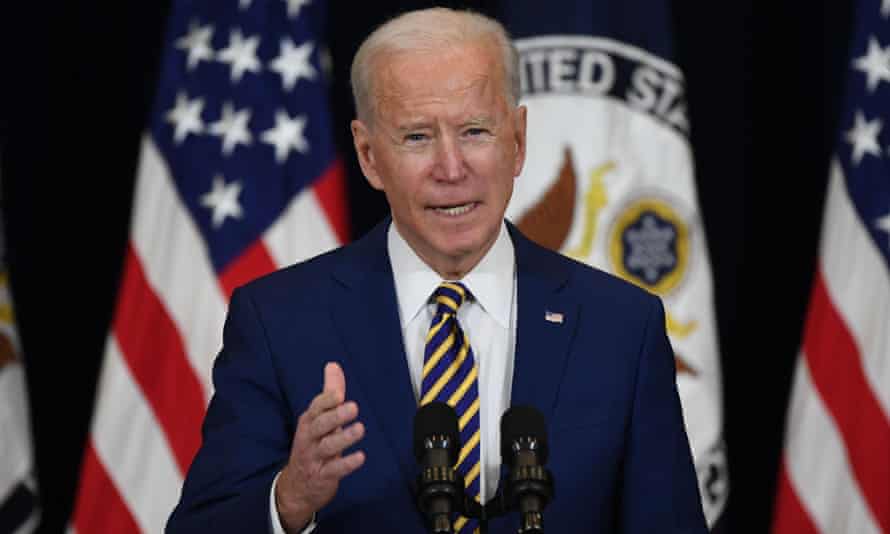Extract from The Guardian
Biden dissolved the decades-old wedge between jobs and the environment. It’s an electoral field that is Labor’s to claim.

Last modified on Sat 6 Feb 2021 06.02 AEDT
Democrat Joe Biden had only been the US president for a week when, on one single day, he rained down enough executive orders to completely reframe the global politics of climate action. After eight years of our local Liberal/National government stalling on meaningful climate policy, Australia is embarrassingly unprepared for the new reality.
Biden already rejoined America to the Paris climate accord on his first day in office. His subsequent action includes protecting a third of America’s land and ocean resources. He’s ditched the contentious Keystone XL pipeline and introduced climate-friendly policies for urban communities and farmers alike. He’s moving the entire US federal road transport fleet to zero-emissions vehicles, there are plans for oil and gas drilling to be prohibited on public land, and for a citizen-led “green corps” to restore damaged lands and waterways. There are mooted tax breaks for wind and solar investment, vast infrastructure spending, carbon pricing and a US$2tr clean energy plan to shift America’s climate grid to run carbon-free within 15 years, building “energy-efficient homes and electric cars and mopping up pollution”.
It’s apparently “just the beginning”. 21 US federal agencies will join a climate mega-body, while the powerfully competent John Kerry – who represented America in Paris – has been enshrined as Biden’s can-do climate czar.
Meanwhile, in Australia, Liberal government MP Craig Kelly may have finally gained a prime ministerial ticking-off for spruiking online coronavirus misinformation, but as of only Wednesday he was still beating a loud drum of climate denialism, unrebuked. Infamous for supporting the outrageous claim that mask mandates equal “child abuse”, Kelly insists “climate alarmism” also, somehow, damages children, on a Facebook page that’s actually heavier with praise for fossil fuels than even for discredited hydroxychloroquine treatments.
The Liberal/National Coalition originally won office with an aggressive promise to destroy successful carbon pricing. They’ve since relied on the backing of fossil fuel barons to be re-elected, their most loyal media pluggers are sceptics, and their fake, scaremongering insistence about the need to maintain a creaking local coal industry is an endless chorus. LNP Senator Matt Canavan has posed in coal-dust drag to promote the industry in which his brother’s an executive. The deputy prime minister, Michael McCormack, couldn’t bear to blame last year’s lethal bushfires on the fact of a crisping climate, so he chose horse-poo instead. As much as Craig Kelly resembles a bug, he’s a feature; he’s a government-appointed member of the parliamentary house standing committee on Industry, Innovation, Science and Resources, and, prime minister Scott Morrison says, he’s doing a “great job”.
How well the likes of Kelly, that committee – or any other part of the Morrison government’s policy apparatus – is going to cope with the world’s most influential economy taking a rapid turn for climate action is now a challenging question for the Liberals. The past four years of rabid anti-environmental Trumpism in the US provided effective cover for an Australian government that was one of the most obstreperous hold-outs on action in and since Paris, and has relied on weasel words rather than deeds to meet the barest of its international climate commitments for years.
Australia’s ruling conservatives may be hoping Republican denialists yet remaining in the American senate will be able to filibuster and obstruct Biden’s agenda from realigning the world economy. They’d do well to absorb that the activist new president has already shredded 100 Trump-era environmental rollbacks with executive orders – and the Democrats’ new senate majority allows the passage of “budget allocations”, filibuster-free.
What America’s Democrats also have is an overwhelming popular mandate for action. Corporations, too, have read the climate room and are already remaking markets and industries. Iconic US manufacturer General Motors is transitioning to carbon neutrality, major investment funds are restructuring assets around climate risk and the US Chamber of Commerce backs a carbon price.
Trump’s loud condemnation of Biden’s pledge to transition America away from fossil fuels turned out to be a grand political miscalculation. Electorally, Biden’s repeated refrain of “when I think of climate change, I think of jobs” dissolved the decades-old, right-confected wedge between labour and the environment. The Democrat’s long-established credibility as a workers’ champion enabled one single sentence to twin a promise of economic opportunity with one for existential relief, and it had potent appeal.
This credibility is something Australia’s anti-union, wage-suppressing Liberals lack, in a policy terrain they ideologically cannot countenance. What Biden’s now blown open wide is a local electoral field that’s entirely Australian Labor’s to claim.
Anthony Albanese may have borrowed his new “jobs, jobs, jobs!” slogan from British Labour’s Keir Starmer, but in a post-pandemic Australia where one million people are unemployed and at least another million are looking for more work, it’s efficient recycling. Labor’s promise of climate-friendly, targeted job-creation is not one the Liberals can match, given their decade of loud disinterest in new industrial opportunities from electric-car-making to renewable energy. It’s all been Labor policy for some time, but the new economy that Biden is building relocates environmental policy from the realm of the ideal to the real.
The Democrats’ winning message was that crucial climate action can take place in the political space between dangerous denialism on one hand and impossible purism on the other - and it speaks directly to Labor’s greatest policy strength; creating jobs in the service of the common good.
If Labor only communicates to Australians with the clarity Biden did in America, it’s a game-changing opportunity; for climate action, for the party, and Australia.
No comments:
Post a Comment